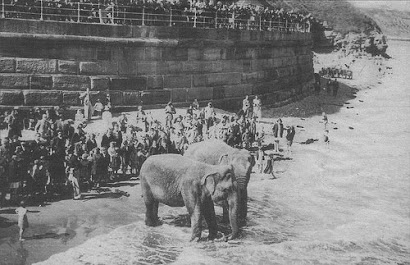
Old Mulgrave Castle
Captain Zachary Steward was born in 1607. The Steward family owned the estate of Lofthouse in Yorkshire, now Loftus, Cleveland. His father was Dr Zachary Steward, Rector of Easington, Fellow of Queen's College, Cambridge and Chaplain to the Archbishop of York. The Stewards of Loftus descended from the Stewards of Ely, Cambridgeshire, who claimed both the royal Stewarts and Oliver Cromwell among their relations. Dr Steward's second cousin, Elizabeth, was Cromwell's mother.
Captain Steward was in his mid-30s when the English Civil War (1642-1651) came to this corner of Yorkshire. A Royalist, he garrisoned Mulgrave Castle for Charles I and became governor of the ancient stronghold, the ruins of which can still be found deep within Mulgrave Woods, near Lythe. In July 1644, following the Battle of Marston Moor, Colonel Francis Boynton came north to reclaim the castle for Parliament. The rendition seems to have happened without bloodshed, an agreement having been made between the two sides. Captain Steward was allowed to ride out of the gates at the head of his men, drums beating, colours flying, having left all arms and ammunition behind. Mulgrave Castle was dismantled by Parliament in 1647, possibly by means of gunpowder, and has been in ruins ever since. Captain Steward had ensured his own house and lands at nearby Loftus were not forfeited. A condition of his freedom was an undertaking that he would be involved in no further hostility towards Parliament.
Steward subsequently made a great fortune through the discovery of alum on his land. He had founded, and owned, the profitable Loftus alum works. His only child, a daughter named Mary, married a Thomas Moore. Their son, Zachary Steward-Moore, inherited the Steward's vast wealth and lived in a large house sited where the supermarket now stands in Loftus Market Place. A flamboyant 18th century hell-raiser, Steward-Moore seems to have been a popular and fashionable man about town. He was a prominent member of the Demoniacks, the North Riding version of the Hell Fire Club. This secret society, founded in the 1740s by John "Crazy" Hall Stevenson, "indulged by night in heavy drinking and obscene jesting". The Demoniacks were based at Stevenson's home in the then rambling medieval castle at Skelton. It gained the name "Crazy Castle", no doubt their nocturnal activities hadn't gone unnoticed in the locality. A fellow Demoniack was Laurence Sterne, author of Tristram Shandy, and it is quite possible that some of the characters in the novel were inspired by his friends at Skelton. The actor, David Garrick, was another visitor.

Old Skelton Castle
Zachary Steward-Moore was said to have shod his horses hooves with silver and kept company with those who, "assisted him in the laborious work of getting to the far end of a great fortune." John Hall Stevenson wrote the following verse about Moore in his "Crazy Tales":
"What sober heads hast thou made ache!How many hast thou kept from nodding!How many wise ones, for thy sake,Have flown to thee, and left off plodding!Philosophy and grace are thine,Not spiritual grace but sprightly;Inspired by the god of wine,Inspired like old Anacreon nightly.Whether thy grace from heaven descends,Or rises from the earth below,Oft hast thou raised thy helpless friends,Oft given thy purse unto thy foe."
Inevitably, Zachary Steward-Moore squandered all his family's money. As his funds dwindled, so did the number of his friends. He saw out the rest of his days in relative modesty at Gibraltar when offered a Lieutenancy there by one of his more loyal former acquaintances.
By Chris Corner.





No comments:
Post a Comment